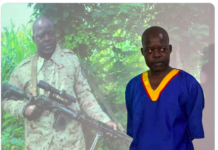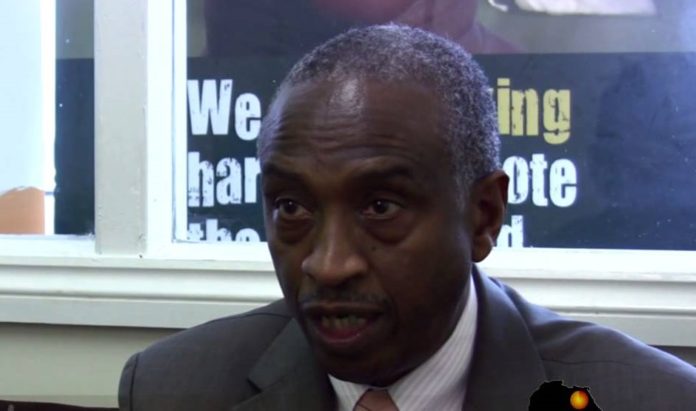[1] After a Stalinist purge of dissenting comrades in arms, General Paul Kagame has established a de facto one-party system and bulldozed the amendment of the constitution to pave the way for a life presidency. One has the right to wonder whether the trend is reversible. The brave decision of Mrs. Ingabire Umuhoza Victoire and other democrats, including Ms. Diane Rwigara, Mr. Mushayidi Deogratias and other political prisoners languishing in prison to have challenged the system, does indicate that the trend is reversible and the movement for democratic change is unstoppable.
When Mrs. Victoire Ingabire Umuhoza, President of FDU-Inkingi, Icon of the struggle for Democracy, returned to Rwanda on the 16thJanuary 2010, she rekindled the fire for democratic governance of the country characterized by peaceful competition for and democratic exercise of power. She spoke[2] loud and clear “… I come for peace and it is this peace that will guide my political action to eradicate injustice and to break all the chains that tie us … I convey to you the warm greeting of your relatives, friends and acquaintances, of your compatriots who remain in exile. They share the same struggle that we are all involved in. We are for peaceful change that restores the honour and dignity to every Rwandan, without further bloodshed … I am a girl who returns home, I come back to fight peacefully for democracy, I return so that together we pool together all our efforts to free ourselves from all obstacles that prevent us from being free. I am not accompanied by an army because I come to you, to my parents, my brothers and sisters. Nobody can stop a child from going home … ”
The system was shaken by the renewed struggle for democracy, it threw her in prison and sentenced her to 15 years in jail, in a political[3]trial and the regime has built a wall of laws that have turned Rwanda into a de facto one-party state.
- 1. Rwanda: a de facto one-party state that has criminalised disagreement with ruling party.
One of the most important tasks of the Opposition is to scrutinise the work of the government constantly to make it accountable to the public. It helps put the spotlight on issues of national interest and to put pressure on the government in power to address them quickly.
However, the ruling RPF party in Rwanda has put in place legal and policy frameworks that criminalise political dissent and hence rules out genuine political Opposition. The framework includes cumbersome administrative procedures that make it hard if not impossible for genuine opposition political parties to register and hence force them to fall foul of the law relating to “organising seditious meetings, illegally forming or leading a political organization” or falling victim of an allay of vaguely defined laws on defamation, sectarianism and divisionism, spreading rumours, minimising , denying genocide, or harbouring genocidal ideology which sanction any statement that questions the official script.
The appointment of party supporters at the helm of the judiciary and the interference of the Executive have seriously undermined its role of the countervailing power of the Executive as the case of Victoire Ingabire Umuhoza has demonstrated. She was sentenced by the top leadership before she even appeared before any court of law. President Kagame had told a Ugandan Newspaper Monitor: “This woman will certainly be where she belongs (prison); now the outsiders who want so badly Ingabire to be an opposition leader here or later on be our President, well, they may wait for a while” In turn the Minister of Foreign Affairs Mrs Louise Mushikiwabo told East African Newspaper reporter, Kezio-Musoke that: “there is no place for people like Ingabire in Rwanda. Not now and not in many years”[4]. These statementswere soon followed by the General Prosecutor who explained why she should be behind bars: “The Prosecution is more specifically concerned with continued posting declarations and newspaper interviews she has been doing. The case against her is not one of robbery in which restraining physical movement would be enough to contain further damage. It is a case of destructive and divisive ideology whose damage does not require physical proximity of the offender”. As expected she was soon arrested, tried and sentenced to 8 years in jail by the High Court. The Supreme Court to which she had appealed against an 8-year jail sentence increased it to 15 years as if to better respond to the wishes expressed by President Paul Kagame and his Minister of Foreign Affairs Mrs Louise Mushikiwabo.
Ms Diane Shima Rwigara was arrested in September 2017, after the President made a statement that even those who stood and failed to stand in presidential elections should be immune from prosecution for avoiding taxes. It was alleged that the company of her father Rwigara had evaded taxes. The charge has changed to forging signatures in her bid to get the right number of signatures to stand as presidential candidate.
All the national political leadership of FDU-Inkingi in Rwanda has been arrested on trumped charges of sensitising members to join an armed group that aims to overthrow the government.
As the Economist Magazine (January 2007) rightly observed “The RPF has marginalized or smeared dissenting voices in the name of “one Rwanda” and the ruling party’s supporters are accruing wealth and power and hence the frenzy of party stalwarts to ensure that the constitution is changed to allow their benefactor, President General Paul Kagame to stand for elections in 2017. The outcome of any popular consultation led by the Ruling Party, in the absence of a free, transparent consultation process that involves the opposition was known in advance. “The state’s reach in today’s Rwanda is not only deep and manifold with little counter-weight, but directly leads to more effective political control. Through its presence and indirect control, a state of surveillance is created. This diminishes open dissent and tightens the reproduction and reproducibility of the official script[5].
Indeed, RPF political cadres, all local administrative leaders, police, army reservists as well as DASSO[6] keep surveillance over the community in their respective localities to ensure that any visitors from outside their localities are recorded giving reason for any visit. They must ensure that ruling party policy is implemented and hunt down and intimidate any person who refuses to join RPF political party.
The FDU-Inkingi representative in Kigali Theophile Ntirutwa has been constantly harassed and threatened by local officials for refusing to pay party fees to RPF because he does not belong to that Party. His house was besieged by local officials on the 22nd of March 2016, asking him to pay the fees.
- Allay of laws that stifle peaceful competition and democratic exercise of power
- i. Registration of political parties
The law relating to formation of political organisations has been framed in a way that makes it hard if not impossible for a political party suspected on not toeing the government line to register. The process is unduly cumbersome, and the administration is totally partisan.Therefore, it became impossible for Mrs Victoire Ingabire Umuhoza to get relevant authorisation from the local administration to register FDU-Inkingi. Instead she was attacked, and her documents snatched by so called “protesters against the registration of the party” within the premises of the local administration under the bemused eyes of Police. She had been lured into the ambush by the local authorities who had lied to her that she should come to pick the authorisation to register her party. She was lucky to escape unscathed into the awaiting car.
Once the registration is refused or deliberated delayed any political activity is punishable under Organic Law 01/2012/OL, article 686 (illegally forming or leading a political organization) and for spreading false information, inciting others to conspire to commit violence, inciting insurrection or participating in a seditious meeting (Art 461 & 463)[7]. Once arrested the regime ensures that the victim is jailed for 6 months to 1 year[8] which are required for a political leader to lose their right to lead a party.
- ii. Peaceful assembly and demonstration
Article 20 of the Organic Law 10/2013/OL governing political organizations and politicians stipulates that political organization who want to organise demonstrations must obtain the authorization of the authorities (all are ruling party members) at least five days before the event. As the UN Special Rapporteur on freedom and association and assembly Mr Maina pointed out in his 2014 report, such legal framework is contrary to the International convention on civil and political rights. It is not conducive to a free and unhindered exercise of the right to freedom of peaceful assembly. Only prior notification should be enough to allow the Police to take measures to protect public safety and order and the rights and freedoms of others. The Human Rights council also makes it clear that “everyone must be able to express their grievances or aspirations in a peaceful manner, including through public protests without fear of reprisals or of being intimidated, harassed, injured… arbitrarily arrested [and]detained…”. These recommendations have never been respected by the Rwanda government as it is clear from the Universal Periodic Review on the human rights situation in Rwanda (March 2016).
While the ruling party’s sponsored protests and demonstrations take place without any hindrance, for example protests against the arrest of Rose Kabuye in Germany and against BBC documentary “Untold Story”, any semblance of protest against government policy as simple as writing a petition, is dealt with heavy handedly.
– In September 2012, Mr. Sibomana, secretary general of the FDU-Inkingi was arrested in a bar in Karongi while holding a critical discussion with friends about government education policies. Mr. Sibomana was charged with “inciting insurrection or trouble amongst the population” (Organic Law 01/2012/OL, article 463). The High Court in Karongi sentenced him, and Mr. Anselme Mutuyimana, a fellow political activist, to six years’ imprisonment. The people in the bar listening to Mr. Sibomana were also charged for “concealing an offense or failing to inform security organs of a felony that is being committed” (Organic Law 01/2012/OL, article 570) and sentenced to two years’ imprisonment.
– On 25 March 2013, supporters of Mrs. Ingabire Umuhoza were beaten up and thrown into jail because they wore badges with the inscriptions “Democracy and justice” and “free Ingabire”. They included Mr. Sylvain Sibomana, Secretary General of the opposition Unified Democratic Forces FDU-Inkingi and Mr. Dominique Shyirambere, a fellow party member were charged with contempt of public officials, illegal demonstration and inciting insurrection and public disorder.
– 20 students were also arrested in September 2013, for taking a petition to the Prime Minister to protest against the reduction of state loans to students enrolled in public universities;
– In September 2012, Mr. Sibomana, secretary general of the FDU-Inkingi was arrested in a bar in Karongi while holding a recruitment meeting. Mr. Sibomana was charged with “inciting insurrection or trouble amongst the population” (Organic Law 01/2012/OL, article 463). The High Court in Karongi sentenced him, and Mr. Anselme Mutuyimana, a fellow political activist, to six years’ imprisonment. The people in the bar listening to Mr. Sibomana were also charged for “concealing an offense or failing to inform security organs of a felony that is being committed” (Organic Law 01/2012/OL, article 570) and sentenced to two years’ imprisonment.
– 7 women Christian ladies were arrested and later charged for inciting insurrection and trouble among the population because of carrying a letter to the President’s office, with a message purported to be from God, asking the President to change his style of leadership so at to pre-empt a looming disaster.
– The President of PS Imberakuri, Mr. Bernard Ntaganda, was arrested weeks before the presidential elections on 24 June 2010 and charged with endangering national security, attempting to organize an Illegal demonstration and resorting to actions that divide people. The Supreme Court confirmed his sentence of four years in prison on 27 April 2012.
– A member of FDU-Inkingi was arrested at the Office of the Prime Minister in December 2015 where he had gone to deliver a copy of a letter the political parties FDU-Inkingi, PDP-Imanzi and PS-Imberakuri had written asking for clearance to hold a peaceful demonstration against changing the Constitution.
- iii. A partisan and politicised Police force.
Law 09/2000 gives a leeway to law enforcement officials to abuse the Basic Principles on the Use of Force and Firearms against peaceful citizens exercising their political and civil rights including peaceful protesters. For example, the Police beat up and caused grievous bodily harm to supporters of FDU-Inkingi within the premises of the High Court, because they were wearing tea shirts bearing the portrait of Mrs Victoire Ingabire Umuhoza and calling for her release.
The First Vice President of FDU-Inkingi narrowly escaped kidnapping and disappearance at the hands of secret police on the 4th of December 2015. He was rescued by passers-by at the time of kidnapping.
- iv. Inability for opposition political parties to recruit
No party can exist without recruiting members. In the case of Rwanda, only the ruling party RPF is allowed to organize public recruitment activities. It is even harder for political parties who have not yet been registered to recruit because potential members fear to fall foul of the law against those joining alleged illegal political parties. The law stipulates that anyone who claims to belong to a suspended or dissolved political organization may be sentenced to up to five years’ imprisonment. In September 2012, Mr. Sibomana, secretary general of the FDU-Inkingi was arrested in a bar in Rutsiro district while discussing critically government and talking about his party’s political programme. Mr. Sibomana was charged with “inciting insurrection or trouble amongst the population” under Organic Law 01/2012/OL, article 463. The High Court in Karongi sentenced him, and Mr. Anselme Mutuyimana, a fellow political activist, to six years’ imprisonment. The 10 people in the bar listening to Mr. Sibomana were also charged for “concealing an offense or failing to inform security organs of a felony that is being committed” (Organic Law 01/2012/OL, article 570 and sentenced to two years’ imprisonment.
- v. Other laws that threaten people expressing dissenting views from government
a) Negation of genocide, and the theory of double genocide
According to article 5 of the Law 84/2013, defines negation of genocide as an act committed in public to state that the killings of 1994 did not amount to genocide, to deliberately misconstrue facts about the genocide, to support a double genocide theory for Rwanda, or to say that the genocide was unplanned. Provisions of the Organic Law 01/2012/OL and laws 84/2013 on the crime of genocide ideology and other related offences are overly broad and open to abuse with a view to limiting any opposition, even moderate and peaceful, to the Government
This underpins the charge against Mrs Victoire Ingabire. The BBC has been the latest casualty of being accused of minimising and denying genocide because it produced a programme “the Untold Story” that included interviewees who claimed that more Hutu than Tutsi could have died during the genocide and accused President Kagame of having shot down the plane carrying President Habyarimana and thus triggering genocide against Tutsi.
b) Minimising genocide
Article 6 of the Law 84/2013 defines the minimization of genocide as the public act of downplaying the gravity or consequences of genocide and/or the methods through which genocide was committed.
c) Justifying genocide
Article 7 defines justifying genocide as any deliberate act committed in public to glorify, support and/or legitimize genocide. Once again, the law is so broad that it can be used against anyone.
d) Sectarianism and divisionism
Law 47/2001, on prevention, suppression and punishment of the crime of discrimination and sectarianism, in article 1.2, defines sectarianism as “the use of any speech, written statement or action that divides people, that is likely to spark conflicts among people, or that causes an uprising which might degenerate into strife among people based on discrimination”. Court may decide under article 6 of the Law 47/2001 to dissolve a political party under this law and fine it up to 20,000,000 RWF (29,390 USD). The main opposition Party MDR had its leadership arrested, charged and detained for 6 months to ensure that they are stripped of their political rights to lead the party again. The law is overly broad and open to abuse with a view to limiting any opposition. This law also underpins the allegations and imprisonment of Mrs Victoire Ingabire Umuhoza for she criticised the government, among other things, over issues of national reconciliation.
e) Spreading rumours
Article 451 criminalizes the action of spreading “false information” with intent to create a hostile international opinion against the Rwandan State. People found guilty of this offence face up to 10 years in prison in peacetime and life imprisonment during wartime. The definition is vague and has come to mean criticizing government policy. This covers any type of challenge to government policy which is the key battleground for any serious opposition. This was used against the FDU-Inkingi chair Victoire Ingabire Umuhoza.
Rwandan journalist, Saidati Mukakibibi, served three years in Kigali’s notorious 1930 prison for a newspaper article considered to have undermined national security. Ms Mukakibibi was convicted together with the Umurabyo editor, Agnes Uwimana-Nkusi, who served an additional one year for having also “defamed” the Rwandan President, Paul Kagame, through another article. In their articles, Uwimana and Mukakibibi criticised agriculture policy, the gacaca court system through which justice is dispensed for genocidaires, and the handling of corruption among government officials.
General Rusagara Frank has been charged under this law for having forwarded to his friends and colleagues, articles and emails critical of government.
f) Inciting insurrection
Article 463 defines as inciting insurrection the actions of: spreading rumours, exciting the population against the established Government, inciting or attempting to incite citizens against each other or, attempting to alarm the population with intention to cause trouble in the country. A person found guilty of inciting insurrection is liable to a term of imprisonment of 10 to 15 years. Any information that does to validate government information is taken as a rumour and punishable. This is a hallmark of totalitarianism.
g) Forming a seditious group
Articles 468 and 469 define a seditious group as one that, among other unspecified objectives, aims to use violence to undermine or overthrow the established Government. These articles impose prisons terms of up to 20 years for all individuals taking part in the seditious group caught in seditious meeting. They hold liable to the same penalty the leadership of the group whether it was present at the meeting and foresee imprisonment up to five years to anyone taking part in such a meeting and caught in the act. Article 470 punishes as an accomplice anyone who knowingly provides help, including the meeting venue, to a seditious group. The ruling party is free to pick and choose the party that it wants to participate in political activity.
h) Revisionism, negationism and trivialisation of genocide
Article 13 of the Rwandan constitution makes “revisionism, negationism and trivialisation of genocide” punishable by law. The vague concept of the crimes of genocide outlined in this allows the government to create a criminal charge out of ordinary political, scholarly, or even everyday debate. The central concept of “genocide ideology” is extremely broadly defined and covers a whole range of legitimate forms of expression that it can be and used against anyone who questions the government line According to the organisation “Article 19”, the definition of “genocide ideology” violates international law under the Convention on the Prevention and Punishment of the Crime of Genocide of 1948 and the International Covenant on Civil and Political Rights of 1966 multiple ways. It also points out that numerous provisions on penalties violate other provisions of International human rights law, notably the Convention on the Rights of the Child 1989.It adds that the penalties associated with the crimes under the Genocide Ideology laws are severe and include penalties for children under the age of twelve.
Conclusion
Every peace-loving Rwandan and genuine friend of the Rwandan people shares the concern of “The UN Special Rapporteur on freedom and association and assembly Mr Maina who noted with concern, in his June 2014 report, over the Rwandan Government’s prevailing hostility towards peaceful initiatives by its critics and the existence of a legal framework that silences dissent. He pointed out that “the fear of a new genocide cannot be invoked to Impede fundamental freedoms in any society, which in fact are necessary to prevent conflicts and genocide. He further stressed that “a society without room for critical voices to speak freely and peacefully is unsustainable”.
Unfortunately, the complacent attitude of the international community and particularly those who champion the values of democracy and human rights has incrementally, step by step, contributed to a situation that has become irreversible i.e. a one-party state and potentially a life President, and thus contributing to creating conditions that make Rwanda’s future foreboding. As Marc Sommers points out “Envisioning a radiant future Rwanda is only possible if one shares the blinders that its government so confidently wears rightly pointing out that Rwanda’s progress is dangerously uneven and so reliant on extreme levels of social and political control that its future is foreboding”. The prevailing opposition to critical debate and free expression of opinions, makes the current social reconciliation process difficult and the future bleak.
President Kagame of Rwanda knows well the consequences of double standards as he unequivocally told the world at the UN General Assembly meeting on 25th September 2012: “Rwanda has first-hand experience with how important the rule of law is and more specifically, the implication of its absence or disregard, and unequal application. That absence destroyed our country in the post-independence decades leading up to the Genocide in 1994, followed by unjust treatment in the name of universal jurisdiction, where it has been very clear that motives veer more towards the political than the legal”.
We earnestly request friends of Rwanda and its people to help build a bright future for Rwanda by using all in their power to bring the Rwandan regime to do the following:
- Open the space in which political parties can freely operate and offer all citizens the right and opportunity to freely form and register a political party
- Remove restrictions on political activities
- Free all political prisoners and cease harassment of opposition party members
Done in London January 28, 2018.
Justin Bahunga,
Commissioner for External Relations and spokesperson.
FDU-Inkingi
RWANDA COMMEMORATES THE 57TH ANNIVERSARY OF DEMOCRACY UNDER THE WORST DICTATORSHIP (PDF)
Contacts: [email protected]; [email protected]; Phone: +44-7988-883-576
[1] http://www.fdu-rwanda.com/en/english-political-opposition-platefrom-p5-memorandum-on-the-situation-of-human-rights-in-rwanda/
[2] http://www.fdu-rwanda.com/en/english-rwanda-judgment-in-victoire-ingabire-umuhozas-case-against-rwanda/
[3] http://www.fdu-rwanda.com/en/english-rwanda-judgment-in-victoire-ingabire-umuhozas-case-against-rwanda/
[5]ANDREA PURDEKOVÁ, Department of International Development, University of Oxford,
Journal of J. of Modern African Studies, 49, 3 (2011) 475-497. © Cambridge University Press 2011
[6] DASSO main responsibilities: 1° to support District authorities to enforce their decisions and instructions that were taken in connection with security; 2° to collaborate with other organs to ensure public order in the District; 3° to arrest any person caught red-handed in the act of disruption of public order and take him/her to the nearest police station; 4° to inform the nearest administrative organs of anything which in its opinion represents a threat to safety; 5° to assist other security organs if necessary; 6° to collaborate with other organs in the prevention and control of disasters in the District.
[7] N° 01/2012/OL of 02/05/2012; Organic Law instituting the penal code
[8] Nº 30/2013 of 24/5/2013 Law relating to the code of criminal procedure






























































